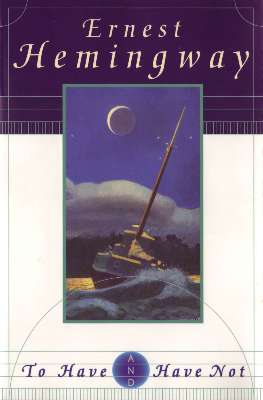

| Click on a book's image or title to order from Amazon.com |

To Have and Have Not
Scribner, TPB, © 1937, 262 pp, ISBN #0-684-81898-1Reviewed March 2006
I don't often read literary fiction, especially of this vintage, so I'm afraid my comments here are likely to be of little use to anyone who comes across them hoping for insight for an essay for school (as sometimes happens with my review of Robertson Davies' Fifth Business), so I apologize in advance. I bought To Have and Have Not having recently seen the film version. Reportedly Hemingway didn't think the book was filmable, and director Howard Hawks sidestepped the issue by filming only part of the book, with much new material mixed in. Consequently, the two bear only a passing resemblance.
So, the book: Harry Morgan is a fishing boat captain in Key West, taking rich men out to fish. When he's stiffed by his client Johnson, Harry - married with two children - is forced to find less ethical means to support himself and his family. He hires his boat to smuggle Chinese into the US, but he double-crosses them, sending him down a dark path.
Some months later, Harry is smuggling alcohol from Cuba to the US when he and his mate are both shot. They manage to return to the US and dump the cargo overboard, but Harry pays a high price, both personally and in the form of the feds impounding his boat.
These two short sections are prologue to the extended third section, in which Harry hires out to carry Cuban refugees over to Cuba, and contrives to rent someone else's boat in order to do so. This section is interspersed with the stories of several other visitors and denizens of Key West, including a couple whose marriage is falling apart, and a variety of rich folks who are staying on their yachts. We get a brief glimpse of Harry's home life, including the deep love his wife has for him, before he sets out on his fateful mission, which all goes tragically awry.
To Have and Have Not seems to be fundamentally about people eking out a living on the edge, and where they go when their ability to keep eking out that living is removed (the story, after all, takes place during the Great Depression). Harry goes down a very dark path and takes others with him, consorting with some very shady and dangerous characters whom he's not entirely capable of handling.
The lives of Harry and his like are contrasted with the tourists in Key West and their problems, and with the rich yachtsmen and their tribulations which seem trivial compared to those of Harry, but deeply significant to them. It's all a matter of perspective, what ruins a life. That said, I think Hemingway is less-than-deft in his weaving of the different outlooks of different members of society, introducing what are plotwise non-sequiturs to make a larger point. The long third section feels much less polished and much less rewarding than the first two sections.
Hemingway's terse prose is indeed quite powerful, managing to convey powerful emotions as well as the stark stoicism which Harry often displays. There's always a sense of menace, and small obstacles are magnified by Hemingway's style into vast challenges and looming tragedy. It's a powerful, but flawed, book, never quite seeming willing to take the plunge and really bare Harry's soul to us.
Oh, the film? The film is loosely based on the first section of the book, with Lauren Bacall's role being nominally that of Harry's future wife. But the crackling romance and dialogue of the film didn't come from the book. They're really very different beasts. I think the film is more fun.
hits since 13 March 2006.